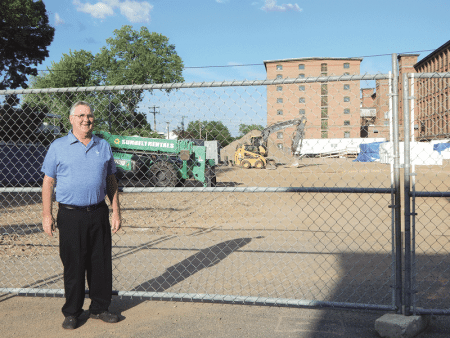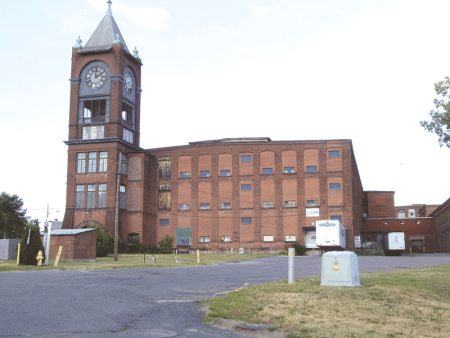Ludlow Mills Projects Create Added Momentum
Community Spotlight

Brian Mannix says plans to transform the clock tower building into market-rate apartments, with retail and office space, could bring young professionals to the community.
Brian Mannix stood at the foot of Ludlow’s new riverwalk behind Ludlow Mills and talked about a future he could clearly picture.
“Think of what it would be like to clear away some of this greenery and have a restaurant with seats facing the river and boutique shops with benches outside,” said Mannix, chair of the town’s Board of Selectmen, as he spoke about Ludlow Mills, the projects underway on its campus, and the unlimited potential the property will hold for years to come.
Eric Nelson says Mannix’s vision may become reality. “We have one building now with the potential for a view of the river, and when we create Riverside Drive, which is on the comprehensive plan for the site, it will open up new vistas,” said the recently named president and CEO of Westmass Area Development Corp., which owns the site and is working to revitalize it. “Plus, we just knocked down two large structures with asbestos between the large mill buildings and the river, and the vistas from them are tremendous.”
The mills encompass a sprawling complex of more than 60 buildings set on 170 acres, and Westmass predicts that, over the next 15 years, more than 2,000 new jobs will be created and retained there, and more than $300 million will be spent in private investments.
Two years ago, HealthSouth Rehabilitation Hospital of Western Massachusetts opened a new, $28 million acute-care facility on the grounds, which marked the beginning of the revitalization of the largest brownfield mill-redevelopment project in New England and kept 75 to 100 jobs in Ludlow.
“HealthSouth was a big jump start,” said Lawrence Curtis, president and managing partner of WinnDevelopment, which specializes in housing and mill redevelopment and has two projects planned at the Ludlow Mills. One is a $24.5 million adaptive reuse of Mill 10 that will result in 63 one-bedroom units and 12 two-bedroom apartments for seniors.
Curtis said that project is fully funded and expected to be complete in the fall. “We’re transforming a vacant building with broken windows into a vibrant space that will contain subsidized and market-rate apartments with beautiful architectural features, including exposed beams and brick and large windows,” he said.
The ambitious second phase of the company’s work was announced at the recent Developers Conference in downtown Springfield, and involves the conversion and reuse of Mill 8, which features the town’s iconic clock tower. The plan is to turn the building’s 231,000 square feet across several floors into 100 to 136 market-rate apartments with commercial, retail, and office space on the first floor. The estimated cost is $60 million, and Curtis said significant funding needs to be secured before work can get underway.
But he considers it an ideal site.
“Ludlow Mills is a beautiful, intact complex situated in the center of town; it’s a great location, and Winn Development and the town of Ludlow are fortunate to have married to take advantage of the space there,” he said, adding that, in the past, many people wondered what would become of the property.
And indeed, the revitalization of the complex and the new projects will make a decided difference.
“The potential of what this will bring to the town is overwhelming,” Mannix said, noting that many fund-raisers have been held over the years to repair the clock tower, and the news that the building will remain and be put to new use makes many residents happy.
“The clock tower is a signature piece that people see when they drive into town, and we hope it will become the icon of the new project,” he continued, as he lauded Westmass and Winn Development for their efforts.
Westmass purchased the site five years ago, and since that time, it has attracted $75 million in public and private investment, outside the newly announced $60 million clock-tower building renovation.
“WestMass has a real desire and determination to use the mill property to put Ludlow on the map, and the redevelopment is a step forward in Ludlow’s future,” Mannix told BusinessWest, noting that the loft-style apartments planned for the clock tower could bring new, young professionals to town, hopefully followed by small boutiques and restaurants to enhance the site.
Nelson said the work that is complete, in progress, and in the planning stages speaks to the partnership that the town formed with Westmass.
“This is the fruit of all that has been done. When the comprehensive zoning and master plan were created, we envisioned these types of projects,” he said, explaining early public meetings with residents to determine what they wanted in terms of preservation and development, which included senior housing.
Progress Report
The majority of buildings that make up the heart of Ludlow Mills on State Street were built between the 1870s and 1920s by Ludlow Manufacturing and Sales Co. From the 1860s through the 1970s, it made cloth, rope, and twine out of Indian-grown jute, flax, and hemp, employing about 4,000 people in its heyday.

Plans are on the table to convert the historic clock tower building into market-rate housing.
Although the property fell into a state of decline after the operation shut down, great strides have been made toward revitalization, thanks to public and private investments, including the one by HealthSouth, which paid tribute to the town’s history by using 100,000 salvaged bricks and planed wooden beams from old mill buildings in its new hospital. Today, the complex is a mixed-use district and home to many small manufacturing and design businesses that include Iron Duke Brewery, which opened in a 3,000-square-foot space in December 2014.
Mannix said the microbrewery has done so well, it plans to add an outside patio with entertainment in the near future.
Potential to build a new senior center also exists at the mill site, and the selectmen recently listened to a proposal presented by Council on Aging officials and Friends of the Senior Center who want the town to build a $10 million, 23,000-square-foot facility on a 4.4-acre parcel of land next to HealthSouth. “They did a lot of groundwork and had a great presentation,” Mannix said.
The mill property has also been enhanced by a riverwalk that officially opened several months ago. It starts behind the clock tower and ends at HealthSouth.
Mannix said the town just received a $429,500 MassWorks grant for the riverwalk that will be used to install new signage to educate people about the history of Ludlow and Ludlow Mills, as well as new lighting and markings that will help make it more accessible.
A great deal of needed infrastructure work has also been completed in the area.
“The water and sewer lines downtown were installed when Ludlow Mills was in its heyday, but were never mapped out. We needed to bring them up to code to have the ability to attract developers and all types of businesses,” Mannix said, noting that a $5 million sewer-separation project was just finished, and close to $4 million has been spent to upgrade the utilities on State Street.
In addition, new curbing, sidewalks, and lighting have been installed along a 1.5-mile stretch on East Street that runs from the bridge to Williams Street.
Although downtown vacancies were on the rise a decade ago, over the past few years new restaurants and beauty salons have been filling empty storefronts.
“We’re finally moving forward in the right direction. We’re looking to improve our downtown district and constantly looking for businesses that want to locate there,” Mannix said.
He noted that Cumberland Farms on West Street just expanded, and the one on East Street recently purchased a former restaurant next door, razed the building, and is building a new, expanded storefront.
A new solar farm is also in the planning stages. Mannix told BusinessWest that Ed Godin, who owns Ludlow Auto Salvage, has closed his decades-old family business and is turning it into a solar facility. It will be the second solar farm in town; several years ago, the Ludlow landfill was converted into a 2.7-megawatt facility by California developer Borrego Solar Systems Inc.
“All of the electricity generated at the landfill is sold to the town at a substantially reduced rate; it saves us $120,000 each year,” Mannix said, adding that he is happy the land owned by Ludlow Auto Salvage will be used to generate green energy.
A new public cemetery may also become part of the landscape; the town is in the process of purchasing 40 acres next to Ludlow Auto Salvage for that purpose. The site was once home to a driving range and has been unused for about a decade.
Mannix said the purchase is important because the town’s current public cemetery will be filled in two or three years, and the new cemetery, located off Center Street or Route 20, will be large enough to last for decades.
View to the Future
Nelson said the town vigorously supported Westmass after it purchased the property, and partnered with the state to secure enough state and federal funding to complete the cleanup of the brownfield site and get the needed infrastructure work done.
“Having these things complete makes it attractive to developers like Winn. Their projects are challenging enough, and having the infrastructure and cleanup completed allows them to do what they do best,” he said. “We’re starting to see people focusing not only on the mills, but on Ludlow itself.”
Indeed, the new HealthSouth Rehabilitation Hospital and work being done by WinnDevelopment are already bringing new life to the area.
“The community has been very receptive to what we are doing, and thanks to our track record, skill set, and interest from the town, a real transformation is happening at the Ludlow Mills,” Curtis said.
Mannix agreed. “The clock-tower project and the transformation of Building 10 will be a giant step forward for the future of the town,” he said, adding that Ludlow already has a lot to offer. “We have top-of-the-line schools and a sports complex behind the high school, our own golf course, a beach at Haviland Pond and a town pool on Whitney Street which both offer extensive youth programs during the summer, a community center, great services which include free trash pickup, a reasonable tax rate, and Lupa Zoo, which is a real asset as it constantly brings new people into town.
“Things are very positive, and a lot of it has to do with the Ludlow Mills and people like Ed Godin,” Mannix went on. “We are very pleased with the growth that is taking place.”
Nelson said every dollar invested in revitalizing a mill property multiplies and has a ripple affect in the community and region in general: contractors get work, there is a need for building supplies, and new jobs are created once projects are complete.
“If you throw a rock in a pond, it makes waves, and the largest waves are right where it lands,” he said.
With a view of the river that will be seen not only from the new apartments facing it, but from many businesses that occupy the property in the future, it’s not hard to see why officials can easily imagine a bright future for Ludlow.
Ludlow at a glance
Year Incorporated: 1774
Population: 9,872 (2010)
Area: 28.2 square miles
County: Hampden
Residential Tax Rate: $18.13
Commercial Tax Rate: $18.13
Median Household Income: $53,244
Family Household Income: $67,797
Type of Government: Town Council; Representative Town Meeting
Largest Employers: Hampden County House of Correction; Massachusetts Air National Guard; Kleeberg Sheet Metal Inc.; R&C Floral Inc.
* Latest information available





